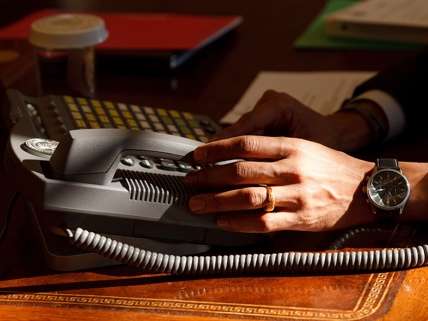President Obama Wants a Back Door on Your Phone. But Not on His.
Secure communications for me, but not for thee.
In yesterday's South by Southwest keynote address, President Obama took a firm stand against strong encryption. Standing before an audience of over two thousand technology enthusiasts, Obama explained why the government needs back door access to all personal communication devices.
If it was technologically possible to make an impenetrable device where there's no door at all, then how do we apprehend the child pornographer? How do we disrupt a terrorist plot? How do we even do a simple thing like tax enforcement? If government can't get in, then everyone's walking around with a Swiss bank account in their pocket. There has to be some concession to get into that information somewhere.
Obama didn't specifically discuss Apple's case with the FBI, though the inference is clear. The president is not content with unlocking the individual phones of suspected criminals. He's asking for specific security protections to be permanently removed from all electronic devices. Because terrorists, child pornographers, and tax dodgers exist, no private citizen should have the right to secure communications.

Buried inside the President's appeals to fear is a principle that's widely understood by security professionals: A back door for the government is, in practice, indistinguishable from a security flaw that makes communication devices vulnerable for everyone.
As Alex Abdo of the ACLU put it, "If the FBI can force Apple to hack into its customers' devices, then so too can every repressive regime in the rest of the world."
The sentiment was echoed by Edward Snowden, who has called Apple's legal battles with the FBI, "the most important tech case in a decade." In a recent interview with Reason TV, Snowden characterized the issue in stark terms. "It's a binary choice: Either all of us have security or none of us have security."
Watch Snowden's extended comments on Apple vs. the FBI below, starting at the 0:53 minute mark.
In the coming months, Obama's hypothetical concerns may become a lot less speculative. Apple is widely believed to be making an impenetrable iPhone, possibly for sale within the coming year, which could render recent legal wrangling moot.
Paradoxically, Obama also used his keynote address to encourage citizens to use technology to reclaim American democracy. "We systematically make it harder for our citizens to vote," he said. "It is much easier to order pizza or a trip than it is for you to exercise the single most important task in democracy."
In theory, voting online is long overdue. But at the very least, a digital election would seem to require the very kind of secure, encrypted communication that the president wants to abolish.
Bonus irony: President Obama still uses a Blackberry because he's not allowed to use the latest technology… for security reasons.


Show Comments (122)